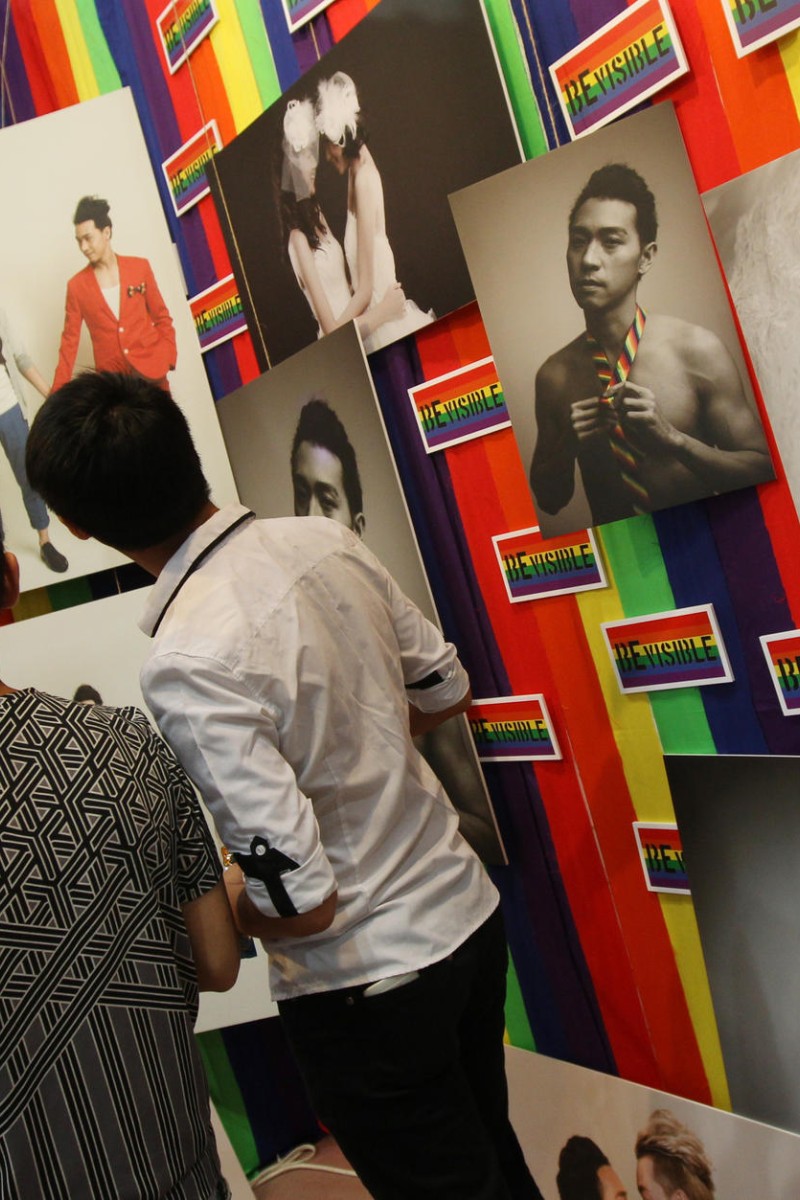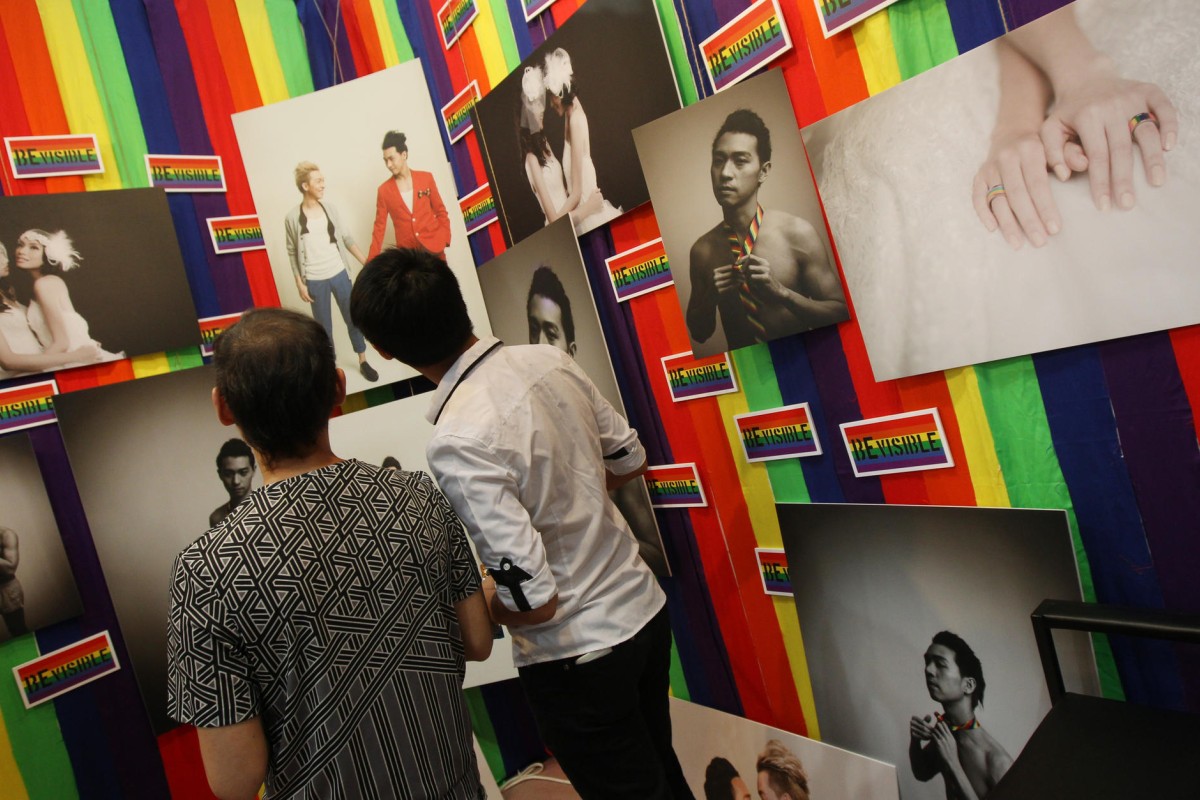
Hong Kong's Gay Pride Parade had more supporters than ever, but comments from a Catholic cleric prove not everyone agrees when it comes to same-sex marriage and gay rights
 A booth run by BEvisible productions , the city's first-ever same sex marriage wedding service organiser, at the Hong Kong Wedding Expo.
A booth run by BEvisible productions , the city's first-ever same sex marriage wedding service organiser, at the Hong Kong Wedding Expo.News
More people than ever before turned out for Hong Kong's gay pride march last weekend, just days after Hong Kong's top Catholic cleric criticised same-sex marriage and in effect urged Christians not to vote for candidates who back gay rights in this month's key District Council elections.
Organisers said 9,500 people - among them 10 top diplomats from the United States, Britain, France and other countries - took part in Hong Kong's seventh annual Pride Parade. During the rally, former health chief Dr York Chow Yat-ngok - who now heads the Equal Opportunities Commission (EOC) - criticised "politics getting involved in church beliefs".
"As a Christian … our religion taught us to love people, have compassion for people, to be gracious, and we are taught not to discriminate [against] people," Chow said.
Many participants urged the government to take immediate action to enact laws to protect sexual minorities against discrimination.
Tommy Jai, one of the parade organisers, said: "We have waited 20 years for anti-discrimination legislation already, and that's far too long."
Leading gay-rights group Pink Alliance ridiculed Cardinal John Tong Hon's suggestion that gay marriage would trigger social disorder. Denmark recognised same-sex marriage in 1989, then introduced same-sex legislation in 2012, and remained one of the happiest countries in the world, the group said.
The Reverend Grace Bok Sha-lun, from the One Body in Christ church in Jordan, weighed in, criticising Tong's "agenda" to "mobilise the Catholics not to vote for candidates" who are gay or support sexual minorities.
"The statement is full of discrimination, and it's contradictory to our core values of our Christian faith … which should welcome everyone," she said.
Caroline Wilson, Britain's consul-general to Hong Kong, told the Sunday Morning Post at the parade: "There's discrimination in Hong Kong. And it's wrong."
Staff writer
Issues
Catholic comments spark debate
The gay pride march in Hong Kong may have seen more supporters than ever before, but this doesn't mean all Hongkongers support rights for homosexuals in the city. Issues such as same-sex marriage are still hotly debated, and a recent statement by the Catholic bishop of Hong Kong sparked reactions on both sides.
Cardinal John Tong Hon, leader of the city's 379,000 Catholics, made the appeal in a pastoral letter, urging voters to consider a candidate's stance on gay marriage when voting in the upcoming District Counsel elections.
It is the second time in two months Tong has used one of his pastoral letters to criticise same-sex marriage.
In his latest letter, Tong wrote: "In recent years, extreme liberalism, individualism, sexual liberation and gay rights movement [activists] … advocated that Hong Kong should introduce a sexual orientation discrimination ordinance and recognise same-sex marriage. This has shaken our society to its core."
Referring to media reports that a student organisation had run what it called a "sex workshop" recently, Tong warned that "twisted trends are no longer spreading in an obscure manner, but they have publicly and openly intruded into our daily lives and directly impacted the next generation".
"In the upcoming district council election and future polls, I urge all believers … to consider candidates' and their parties' stance on family and marriage issues, as well as their position on a law to ban discrimination on grounds of sexual orientation," Tong said.
The cardinal also asked clerics to share his "urgent appeal" with Catholics as soon as possible through church news bulletins, notice boards and Facebook pages. The message must also be read during Sunday mass.
People Power lawmaker Raymond Chan Chi-chuen, who is openly gay, criticised Tong's message and said it reflected a backward view of social movements and possibly deviated from the Vatican's line.
"The current pope has been calling for respect for the LGBT [lesbian, gay, bisexual, transgender] community. I do not understand why Tong would make such a comment at a time when worldwide Catholics are becoming increasingly liberal in handling the issue," Chan said.
A spokesman for the Labour Party said Tong's view was "obviously different" from that of Pope Francis, who in 2013 said: "If [homosexuals] accept the Lord and have goodwill, who am I to judge them? They shouldn't be marginalised. The [homosexual] tendency is not the problem."
Legislation a distant dream
Same-sex marriage continues to be a divisive issue in Hong Kong. While there has been talk of introducing legislation for equal marriage rights for years, the head of Hong Kong's equality watchdog doubts whether Hong Kong will introduce a same-sex marriage law, saying this would likely not happen in his lifetime because the city remained divided on the issue.
EOC head York Chow said the watchdog had no power or permission to propose such a law.
Chow said it was unlikely that Hong Kong would handle the gay marriage issue the same way as the United States, where the Supreme Court ruled in favour of marriage equality in June.
He described Hong Kong's courts as "passive" - only addressing the issue if a case is brought forward.
Chances of the Legislative Council passing such a law are also slim, Chow said. This is reflected by the lack of support for a recent proposal to outlaw discrimination based on sexual orientation.
"We can look at how legislators view equal rights for gays and lesbians - not to mention marriage," he said. "What is the support rate among legislators? I am not very optimistic."
Hong Kong has anti-discrimination laws covering gender, family status, disability and race, but not sexual orientation. These laws also do not specifically protect LGBT people.
The EOC has been pushing for the past few years to strengthen legal protection for gays and other marginalised groups.
However, rival associations have opposed the idea of passing laws to protect gay rights, saying this would infringe upon their "freedom of speech" and encourage homosexuality.
But Chow said Hongkongers must not bury the debate on same-sex marriage.
"I think more discussion will help the community gain a better understanding and they will eventually seek a more rational way to handle the issue [of LGBT rights]," he said.
He also remained optimistic that the younger generation in Hong Kong would be more receptive to same-sex issues.
Chow said many young people he had met "were far more accepting of same-sex marriage".
Not everyone agrees
And with the younger generation taking a more active role in Hong Kong politics, some rights groups believe now is the right time to push for new laws - starting with anti-discrimination.
Members of sexual minorities advocacy group Rainbow Action said they wanted to see a beefed-up anti-discrimination law in Hong Kong before the city took on same-sex marriage.
Tommy Chen, of Rainbow Action, said it was impossible to separate the question of equal marriage rights from that of equal protection for lesbian, gay, bisexual or transgender people.
Those who oppose the expansion of legal protection for gay people, however, say they represent a significant proportion of Hongkongers.
Roger Wong Wai-ming, convener of the Family School Sexual Orientation Discrimination Ordinance Concern Group, said he had received more than 100 calls from concerned parents after a Christian group shared Chow's comments on Facebook.
He said the number of calls from parents showed the level of opposition.
"Parents are concerned that same-sex marriage will come to Hong Kong because the United States has influence on our culture indirectly," Wong said.
Chen said the attention anti-gay marriage groups had been getting was beneficial for Rainbow Action and its allies: lawyers are now offering to work for free to test the legality of same-sex marriage in Hong Kong's courts.
List of consul-generals and diplomatic representatives who supported LGBT rights at the Hong Kong Pride Parade 2015:
- Eric Berti, the Consul-General from France
- Caroline Wilson, the Consul-General from Britain
- Karsten Tietz, the Deputy Consul-General from Germany
- Tom Cooney, the Deputy Consul-General from the United States
- Wictoria Amandustin Weinstock, the Deputy Consul-General from Sweden
- Caitriona O'Sullivan, the Vice-Consul from Ireland
- Shalini Anand, the Consul from Canada
- Wilhelm Zemp, the Vice-Consul from Switzerland
- Steven Hodge, the Vice-Consul from Australia
- Minna Tikka from Finland's Consul General Office
- Jolita Pons, the Head of Political, Press and Information Section of the EU Office
- Robert Ness, Director, British Council Hong Kong
Voices
"To Hong Kong, same-sex marriage is an inescapable issue."
Chairperson of the Equal Opportunities Commission, York Chow
"The world is fast-changing. Things change and we have to cope with the changing world without compromising our faith, our core values, and our vision and mission."
Bishop of Hong Kong, Cardinal John Tong Hon
"In Hong Kong, the government presently provides virtually no legal recognition to same-sex couples. Although the development of human rights protections should not be contingent on public opinion, our survey results indicate that there is ample public support for extending rights to committed same-sex couples, short of legalising same-sex marriage."
Associate professor at the University of Hong Kong's Faculty of Law, Kelley Loper
Bonus Point
74 - Percentage of Hongkongers who support granting same-sex couples all or some of the rights enjoyed by heterosexual couples, according to a University of Hong Kong study
WORD WATCH
Divide (verb)
Meaning: to separate or cause people to disagree
Use it: The blocking of Johannes Chan Man-mun's appointment as HKU's pro-vice-chancellor has divided society, and highlights the deep mistrust between the pro-democracy and pro-establishment camps.
Divisive (adjective)
Meaning: tending to cause disagreement or tension
Use it: The Occupy movement did not have a long-lasting divisive effect on secondary schools, according to a study.
Division (noun)
Meaning: disagreement between two groups
Use it: The leaders of China and Taiwan met in Singapore recently to try and mend the division between the two countries.